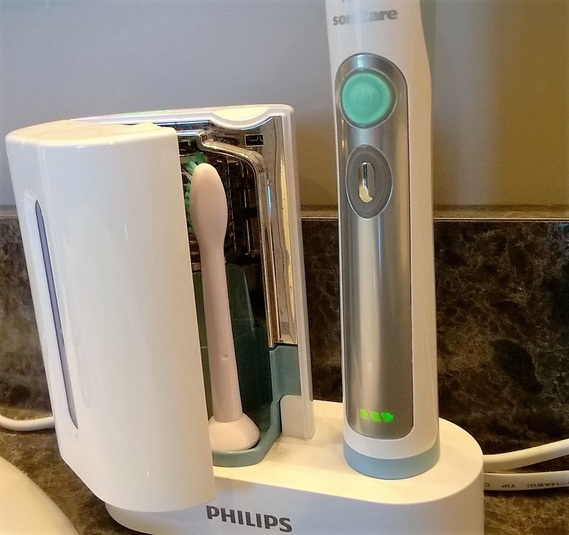By definition, dentists care about dental hygiene (or they would have chosen a different career), so it makes sense for them to advocate the use of products that have been scientifically proven to make teeth and gums healthier. This is presumably, the reason why they sell any electric toothbrushes in the first place. Furthermore, if a medical professional is recommending something, they’re basically staking their professional reputation on it so it’s reasonable to conclude that they would favor a particular brand/model over just any kind in general. And lastly, Sonicare is one of the top electric toothbrushes available so it’s not like they were recommending the dentist’s cousin’s private label of dental care. Taking all of this into account, it doesn’t seem “shady” in any way for a dentist to recommend and sell toothbrushes. And the reason for trying to get patients to buy them before leaving? Sure, they probably make a small percentage of the sale, but more likely, they know that people will tell them anything that they want to hear (“I’ll buy an electric toothbrush the next time I go to the store”, “I’ll start flossing every day!”, etc.) and then walk out the door and never follow through. By getting someone to make the purchase on the spot, they can avoid a situation where someone procrastinates and then forgets to make good on their promise. So why was this woman so angry? Consumer skepticism.
1. Be Transparent
Businesses with a lot of transparency have serious street cred, to the point where their customers will actually defend attacks on their character for them. Being honest with your customers about what’s going on behind the scenes can go a long way in extinguishing the fire of consumer skepticism. The dental hygienist that recommended the electric toothbrush could have said “We sell Sonicare toothbrushes here in you want to buy one before you leave. They’re a little cheaper at a drug store or grocery store, but this way you won’t have to remember to make a special trip just to buy one.” And the lady would probably have let her guard down.
2. Disclose Relevant Information
It’s important to give your customers all of the information that might influence their decision. Saying something like “We sell Sonicare toothbrushes here, but Oral-B works just as well if you prefer to use that brand!” is a great example. Similarly, if the dentist also uses the brand of toothbrush that her or she is recommending, that can be helpful information as well. Disclosing relevant information on both sides of the coin makes you look more trustworthy and gives your customers a better view of the whole picture so that they can make an informed purchase decision without skepticism clouding their judgement.
3. Abide by The Law
This goes without saying (or maybe it doesn’t) but you should always abide by state and federal laws when it comes to recommending and selling products to your consumers. But don’t just rely on the law to tell you what is and isn’t an acceptable practice – rely on your gut as well. If it feels shady, don’t do it!
Kate Pierce is the owner of LionShark Digital Marketing LLC, a West Michigan internet marketing company. Her areas of expertise include Paid Search, Search Engine Optimization, Social Media, Web Consulting for small businesses, Copywriting and Local Online Marketing. She lives in the Grand Rapids area with her husband and enjoys cooking, watching sports and spending time outdoors. Like a true digital marketing expert (i.e. geek), she loves talking about marketing theory and SEM trends… so don’t say you weren’t warned!


 RSS Feed
RSS Feed
